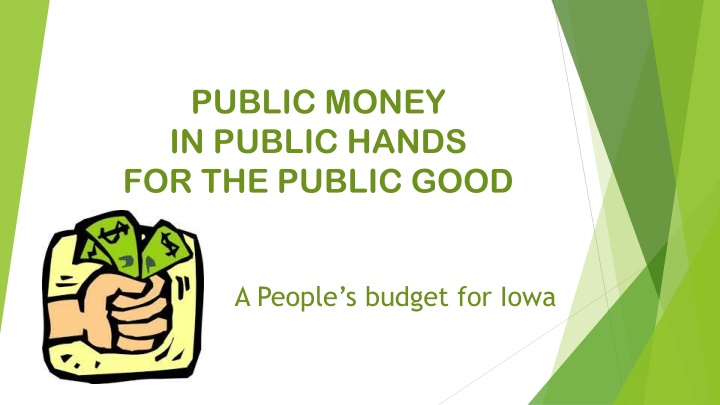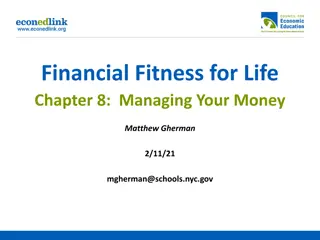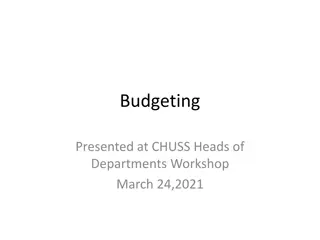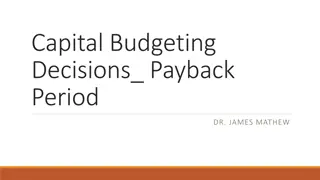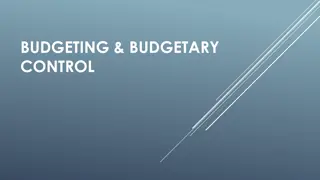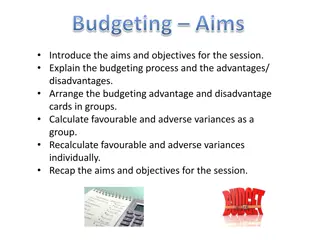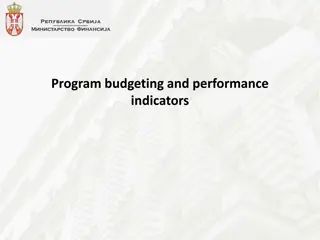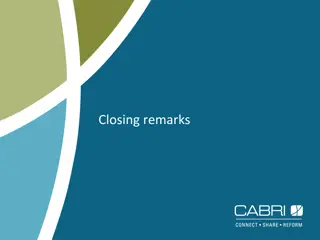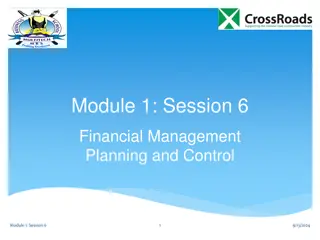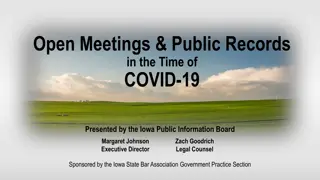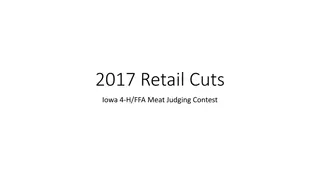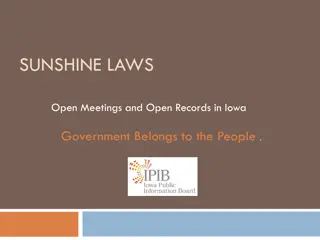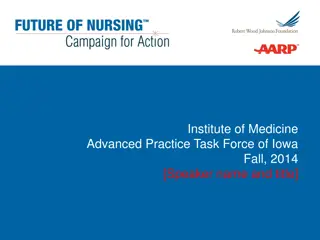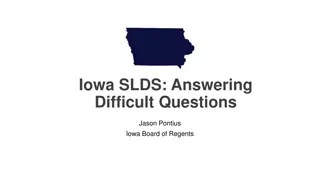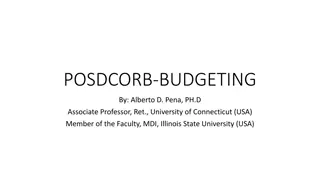Prioritizing the Public Good in Iowa: A Call for Responsible Budgeting
Emphasizing the importance of public trust and common assets, this content advocates for a people-centered budget in Iowa, highlighting the need for government to fulfill its fiduciary duties to serve the common good. Governor Reynolds' budget orientation towards the economy is critiqued, with a focus on funding key areas such as education, public health, environment, and infrastructure within state budget principles. The overarching message is the necessity for transparent, equitable, and accountable budgeting practices that prioritize the well-being of all citizens.
Download Presentation

Please find below an Image/Link to download the presentation.
The content on the website is provided AS IS for your information and personal use only. It may not be sold, licensed, or shared on other websites without obtaining consent from the author.If you encounter any issues during the download, it is possible that the publisher has removed the file from their server.
You are allowed to download the files provided on this website for personal or commercial use, subject to the condition that they are used lawfully. All files are the property of their respective owners.
The content on the website is provided AS IS for your information and personal use only. It may not be sold, licensed, or shared on other websites without obtaining consent from the author.
E N D
Presentation Transcript
PUBLIC MONEY IN PUBLIC HANDS FOR THE PUBLIC GOOD A People s budget for Iowa
All political power is inherent in the people. Government is instituted for the protection, security, and benefit of the people, and they have the right, at all times, to alter or reform the same, whenever the public good requires it. Bill of Rights to the Iowa Constitution, Article I, Political Power, Section 2
Government as growing the economy VERSES Government as trustee of all the things we share also known as the commons Protecting, enhancing and restoring our shared public wealth is the central responsibility of government.
Government Is the Trustee of the Things We All Share A fiduciary duty is a legal obligation to take care of assets for the sole benefit of a designated beneficiary. It is time for government to return to its primary function of serving the public good, the common good.
Governor Reynolds The 2018 budget for Iowa put forward by Governor Reynolds is built on the premise that government s primary responsibility is to the economy; it woefully neglects the common assets of the State. The four goals of the Reynold s budget reflect her view of what government is for and stand in sharp contrast to the fiduciary duties of government: Her goals are: Create a Competitive Business Environment; Develop the Most Innovative Energy Policy in the World; Educate our Children for the Knowledge Economy; Train Iowans for the Jobs of Tomorrow. Even education is designed to funnel kids into the economy, rather than develop their unique skills and enable them to be effective citizens.
The public trust should be designed into the state budget. The public or common good All must be funded sufficiently. 1.Education 2.Public health 3.The environment 4.Infrastructure such as road and bridges 5.Government services such as courts
State Budget Principles 1. The common wealth and public health are the basis of the economy. 2. Tailor the budget to the public assets. 3. Corporations must pay their fair share. 4. No privatization of essential governmental responsibilities. 5. Fund solutions that solve more than one problem. 6. Prevent problems rather than clean up the mess later. 7. Keep public money within the state. 8. Budget and spending processes should be transparent and accountable. 9. Taxes should be fair. 10. Tax incentives should benefit the public good and the commons. 11. Revenue should be adequate to care for the common wealth and public health. 12. Revenue streams should be stable and predictable. 13. The tax system should be simple.
THE BUDGET PROCESS 1.Revenue estimation 2.Guidelines sent to state agencies in June or July 3.Departments compile budget needs 4.Agency hearings held in November 5.Public hearings held in December 6.Governor submits proposed budget to Legislature by Feb 1 7.Legislature adapts a budget by April or May 8.Governor approves or changes budget and returns it to legislature 9.Budget goes back to governor for approval 10.Fiscal year begins in July
Recommendations for a Peoples Budget 1.Set goals 2.Designate a legal guardian for future generations 3.Establish robust funding for essential government services 4.Establish corporate tax rate at an appropriate level to fund key state budge goals 5.Eliminate corporate tax incentives 6.Hold public meetings around state to solicit public input 7.Transparency on where money comes from and how it is spent 8.Establish a state bank
How to get involved 1.Attend the public hearings in November or December 2.Write the governor 3.Write your state senator and state representative
